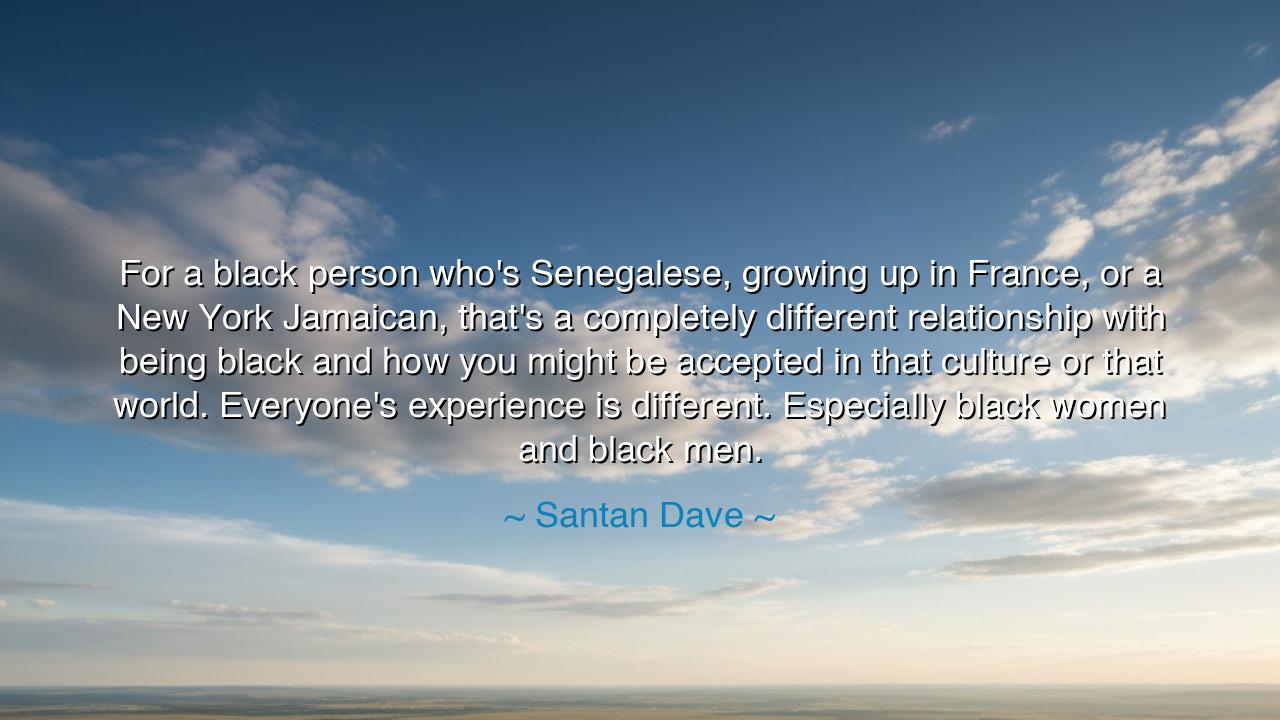
For a black person who's Senegalese, growing up in France, or a
For a black person who's Senegalese, growing up in France, or a New York Jamaican, that's a completely different relationship with being black and how you might be accepted in that culture or that world. Everyone's experience is different. Especially black women and black men.






Hearken, O children of the ages, to the words of Santan Dave, who speaks with the voice of awareness and truth: “For a black person who’s Senegalese, growing up in France, or a New York Jamaican, that’s a completely different relationship with being black and how you might be accepted in that culture or that world. Everyone’s experience is different. Especially black women and black men.” Here lies the timeless teaching that identity is not uniform, but shaped by the lands we walk, the people we meet, and the histories that flow through our veins.
In the chronicles of old, the elders observed that the essence of a people is reflected in the context of their journey. To be black in one land is not the same as to be black in another; the customs, judgments, and acceptance of society mold the soul’s path. Dave reminds us that the relationship with identity is layered, shaped by geography, ancestry, and communal perception, and that the inner truth of one’s being must navigate the varied currents of culture and world alike.
The origin of this wisdom is ancient, carried through the stories of diasporas, migrations, and crossings of seas and lands. Across generations, those who traveled far from their ancestral homes discovered that being seen, accepted, and understood depends not only upon who one is, but also upon the eyes and hearts of the society in which one dwells. Experiences differ as the rivers diverge, yet all carry the same waters of heritage, resilience, and identity.
O seekers, understand that the diversity of experience is sacred, and that black women and black men carry within them histories and perspectives uniquely shaped by their place and passage. To honor this is to recognize that identity is neither singular nor static, but a living relationship with self, community, and the wider world. Acceptance, struggle, and growth are intertwined, and each journey demands both awareness and compassion.
Let this teaching endure, children of the future: cherish the multiplicity of experience, and honor the varied paths through which identity is expressed and received. Recognize that the relationship with being black is not universal, but deeply personal, shaped by culture, circumstance, and ancestry. In this understanding, empathy flourishes, communities are strengthened, and the sacred diversity of the human spirit is celebrated in its fullest measure.
If you wish, I can also craft a more poetic, ceremonial version, where the relationship with being black is depicted as a river flowing through lands, histories, and hearts. Would you like me to do that?






VCLam Vong Co
This quote is a powerful reminder of the diversity of experiences within the black community. It’s easy to assume that being black means having a similar experience, but Dave points out how cultural differences play a huge role in how one is perceived and accepted. How can we build more inclusive conversations that account for these varied experiences, especially when discussing race and identity in different parts of the world?
DDNguyen Huu Duc Duyet
Santan Dave’s words remind me that race is often tied to geography, culture, and gender. Growing up black in France versus the U.S. can lead to entirely different challenges. I wonder—how often do we take the time to listen to individual experiences within the same racial group? Can we truly understand each other’s struggles if we don’t take into account these different cultural and societal contexts?
PTNguyen thi p thanh
This quote really struck me because it acknowledges the complexity of being black in different cultures. It’s easy to generalize experiences based on race, but the reality is much more layered. For instance, how does race play out differently for black men and women? Are there experiences that women face that men do not, even within the same racial group? How can we better support black communities across these varying identities?
BKNguyen Pham Bao Khanh
Santan Dave’s quote highlights how diverse the experience of being black can be, depending on where you are and what your background is. It makes me think about how race and identity are not monolithic but shaped by culture, geography, and gender. Do you think that understanding these nuances is important for fostering greater empathy and solidarity between different black communities around the world?